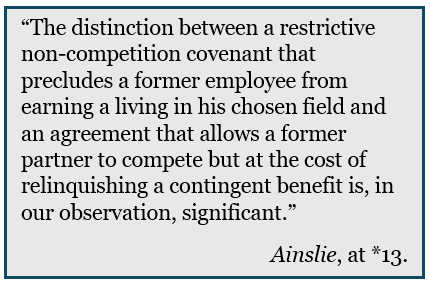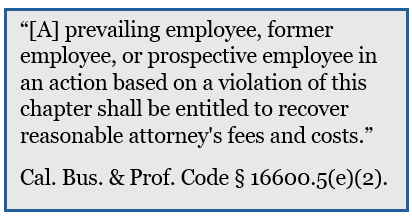
Crafting employment agreements that protect a company’s legitimate interests upon separating from its executives can be daunting. Which state’s laws apply? Have those laws changed since your last employee signed your agreement? How can you protect your competitive edge while minimizing litigation risk?
This year a new California law took effect that even more broadly prohibits, and even retroactively voids, nearly all “non-compete” agreements—i.e. contract clauses that limit an employee’s ability to compete with your business upon departure. But who is an “employee”? Which former employees does the law cover? And how will the exceptions to the law be interpreted? These remain open questions, though statutory language and past case law provide strong clues as to how they will be answered.
California law, even before its recent expansion, has barred all contractual provisions that substantially restrain “a person’s ability to practice a profession, trade, or business” outside of limited exceptions relating to the sale of a business or partnership dissolution. Cal. Bus. & Prof. Code §§ 16601, 16602, 16602.5. Federal courts applying California law have upheld the state’s broad prohibitions. In 2018, for example, the Ninth Circuit voided a settlement agreement between a doctor and his former medical group that was intended to limit the doctor’s ability to compete with his former association. See Golden v. California Emergency Physicians Med. Grp., 896 F.3d 1018, 1020 (9th Cir. 2018). Where California law applies, the prohibition on restraints on trade has thus long extended beyond the traditional non-compete agreement.
Delaware, in contrast, does not outright prohibit traditional non-compete agreements. Instead, such provisions are disfavored under Delaware law and reviewed under the reasonableness standard. If a non-compete agreement is sufficiently limited, courts applying Delaware law may enforce the agreement against the former employee.

On January 29, 2024, the Supreme Court of Delaware went a step further and reversed the Court of Chancery to hold that a so-called “forfeiture for competition” provision in a limited partnership agreement is enforceable without a reasonableness review. Cantor Fitzgerald, L.P. v. Ainslie, 2024 WL 315193 (Del. Jan. 29, 2024). The contract at issue in Ainslie provided that a limited partnership could withhold distributions to a former partner who engaged in competitive activities within four years of their departure. The Court balanced opposing public policy considerations: on the one hand, Delaware law recognizes the importance of freedom of contract between sophisticated parties, and on the other, it values the protection of competition. The Delaware Supreme Court came out in favor of contract rights. In the Court’s words, “[w]hen sophisticated parties agree in a limited partnership agreement that a partner, who voluntarily withdraws from, and then competes with, the partnership, will forfeit contingent post-withdrawal financial benefits, public-policy considerations weigh in favor of enforcing that agreement.” Id. at *13.
Barely two weeks after Ainslie, the Third Circuit applied the decision to uphold a stock clawback provision against a former corporate vice president under Delaware law. W. R. Berkley Corp. v. Dunai, No. 22-2963, 2024 WL 511040, at *3 (3d Cir. Feb. 9, 2024). As Dunai shows, if Delaware law applies, there is little question that forfeiture or clawback provisions agreed to by sophisticated parties are enforceable.
Where does that leave Delaware companies with California-based employees or even headquarters? California’s new law states that “[a]n employer or former employer shall not attempt to enforce a contract that is void under this chapter regardless of whether the contract was signed and the employment was maintained outside of California.” Cal. Bus. & Prof. Code § 16600.5(b) (emphasis added).

Whether this effort at extraterritorial reach will be upheld remains to be seen, but one thing is clear. Businesses with California operations or employees who seek to limit competition through forfeiture or claw back provisions where none of California’s exceptions to its bar on contractual trade restraints should prioritize a robust choice of law analysis.
The potential risks of imposing contract terms that are void under California law are high –the statute includes a private right of action and attorneys’ fees. There is thus no doubt that choice of law and extraterritoriality will face legal challenges in the years to come.

